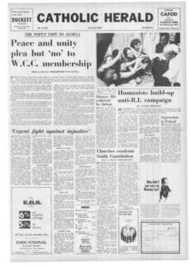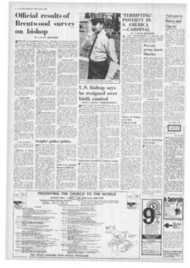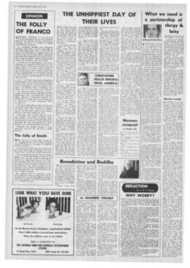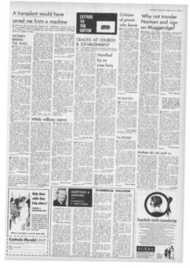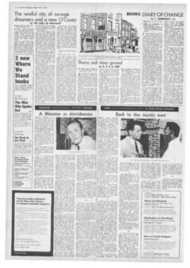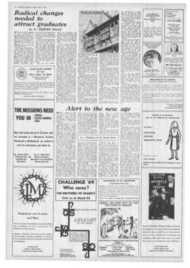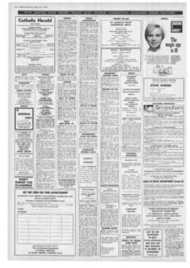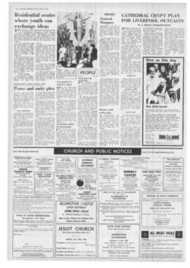Page 6, 13th June 1969
Page 6
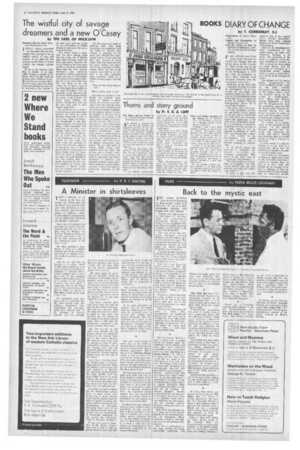
Report an error
Noticed an error on this page?If you've noticed an error in this article please click here to report it.
Tags
Share
Related articles
Films By Freda Bruce Lockhart
Disturbing Mirror On Our Preoccupations
Films By Freda Bruce Lockhart
Freda Bruce Lockhart Films
Gallant And Gentle Cinema Critic
• Back to the mystic east
by FREDA BRUCE LOCKHART
THE cinema pendulum
may at last be beginning its long-awaited swing back from the "X"-age to a more wholesome concern with human and other animals
Nobody will need urging to see The Guru ("U." Academy One) who remembers Shakespeare, Wallah, James Ivory's earlier delightful cornedy about an English theatrical company touring India in the wake of the British Raj.
The story of the new film, which introduces swinging Britons to mystic Indians, may he less original and cogent. The comedy has the same flavour of affectionate mockery of both sides, the Indian domestic scene the same fascination.
A leading English pop-singer (Michael York) goes to India to learn the "sitar" from a leading guru (Utpal Dutt): not such a far-fetched situation.
Each in a way seems his side's commercial idol; and their bickering conflict of wills and temperaments is conducted against a background of extraordinary beauty, elegance and poise, whether of the settings and costumes or of the Indian actresses (the Guru has two wives and five daughters. with a marvellous performance by Madhur Jaffrey as the senior wife).
The Guru's amiable bombast is nicely pricked i,n a. lovely scene of his visit to his own Guru, who puts him in his place: the pop-singer is a sweet innocent anyway The character who comes off
worst is Jenny (Rita Tushingham), the round-eyed English girl who goe out to worship the Guru and comes home to marry the pop-singer. Although the moral of it all is still "never the 'twain shall meet." there is a little love gained on both sides.
The late Carson McCullers was a writer with a unique knack for getting under the protective varnish people grow over their most vulnerable sensibilities. I have not read her novel on which The Heart is a Lonely Hunter ("A," Warner) is based and the movie may sound like too dense an accumulation of hard cases. The hero, Mr Singer (Alan Arkin). is a deaf-mute, disciplined and well-adjusted, who can only hear with his eyes and speak — fluently — with his fingers. His one friend, who is also a "dummy," to -use the cruel slang, is committed to hospital. In the household where Singer lodges, in typical McCullers Deep South town, the father is crippled by an accident, the teenage daughter (Sandra Locke) frustrated and deprived of the music she wants. There is the splendid Negro doctor who diagnoses his own cancer, and his tiresome militant daughter, among yet more unfortunates.
Ellis Miller has directed this as a study not of the modish malady of non-communication, but of individuals whose loneliness is built-in. The feelings are true and immeasurably poignant.
Alan Arkin's performance is the more moving for being beautifully controlled. The
children inevitably recall that other fine McCullers film, Member of the Wedding; and if Sandra Locke is not yet Julie Harris, she's a marvellously promising find.
Run Wild, Run Free ("U," Odeon, Leicester Square) is an outstanding example of the time-honoured type of story about animals and children, or more often about one animal and one child.
Unfortunately coincidence has given LIN another hero at least temporarily dumb. But this affliction of Philip's (Mark Lester of Oliver!) is due to the failure of his parents to communicate any affection, so that his only love becomes the ravishing white Dartmoor pony who is the picture's real hero. A very beautiful kestrel might almost be called its tragic heroine.
The trouble with these childanimal stories is that there is invariably at least one agonising climax, unbearable to watch on behalf of the animal characters, or to guess at on
behalf of the animal performers. But anybody oblivious to such matters will be enraptured by the beauty of Dartmoor, all swirling mists and greensoft contours, and •of bird and pony. Every child who sees it will surely demand a white pony.
Apart from Bernard Miles in one of his nicer rustic cameos. the only grown-up to come off well is John Mills as a very benevolent neighbour.
All these three movies are humane in their concerns. The Italian Job ("U," Plan) is strictly mechanical. The story (by Troy Kennedy Martin) is about a great bullion robbery, planned and directed from a British jail by a respected senior convict (Noel Coward), and executed in Turin by Michael Caine and a gang.
Some of these early scenes are funny, thanks mostly to Mr. Coward. More are distasteful owing to determined mockery of the Royal Family and of patriotism generally (even the robbery becomes a
British victory). But when the object is gained of reducing Turin's traffic to chaos, with a troupe of stunt-drivers with their Mini-Coopers flying through the air or speeding up and down staircases, it really does become a spectacular circus with a literally cliffhanging climax. Peter Collinson directed with gusto.
Scenes of a front-line Japanese field hospital in the late Japanese-Chinese war, look and sound so horrific in The Red Angel ("X," Cinecenta), and surely truthfully so, that I find it impossible to decide exactly why the supposedly contrapuntal scenes of love in the surgery should have such a grotesque effect of bathos. This is the kind of picture which makes the existence of a censorship incomprehensible.
In honour of the 25th anniversary of D-Day Twentieth Century are reissuing in wider screen The Longest. Day ("A." Dominion), their all-star quasidocumentary account of the Allied invasion of Hitler's Europe.
blog comments powered by Disqus


